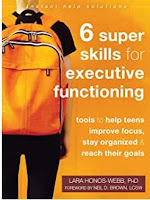STUDY LIKE A CHAMP by Regan A. R. Gurung and John Dunlosky is subtitled “The Psychology-Based Guide to ‘Grade A’ Study Habits.” And while the information might be helpful (more on that in a moment), the text fails to offer an attractive cover or a truly compelling message. The New York Times recently published a guest opinion piece by Jonathan Malesic which commented on how important the desire to learn truly is. Honestly, it seems rarer and rarer as students (and their parents) chase grades instead of learning for its own sake. Gurung and Dunlosky, psychology professors at Oregon State and Kent State, respectively, had an opportunity to address this trend and failed.
They do cite work by John Hattie which reinforces the importance of self-motivation and
the way in which a student approaches studying. However, STUDY LIKE A CHAMP itself is
written as though the intended audience is other psychologists (maybe some
teachers or education administrators would be curious, but even they would likely
tire of slogging through this text). Even though Gurung and Dunlosky say “you”
(seemingly addressing student readers) frequently, this manuscript is not geared
to a middle or high school student. Explicitly modeling a poor writing style
and dryly explaining metacognition or the cycle of self-regulation (in a figure
without a memorable diagram) are not going to attract converts amongst the many
students struggling with building better study skills. The authors need crisper
language and at least some images to attract attention – the preview text references
Table 1.1 (a summary of key skills?), but it is not provided. There is a Figure
1.1 and an Exhibit 1.1 which again gives a subtle clue as to how research oriented
and unengaging this supposed study guide is. There are attempts to be helpful such as ending each chapter with a summary, plus flowery "key training tips" and "go for the gold with advanced reading." However, consider Chapter 2's suggestion: a thirty-four page scholarly article in the Journal of Educational Psychology. Really?!
We know (especially given disruptions driven by COVID) that students need help/guides/tools now more than ever. Other publishers (e.g., Adams Media, Crown, and DK) produce books on study skills (we also reviewed these), many of which have real-world contributions from educators. STUDY LIKE A CHAMP is a disappointment; even this short 2020 article, also published by the American Psychological Association, is a more accessible overview. Turn instead to Outsmart your Brain by Daniel Willingham (review forthcoming).







